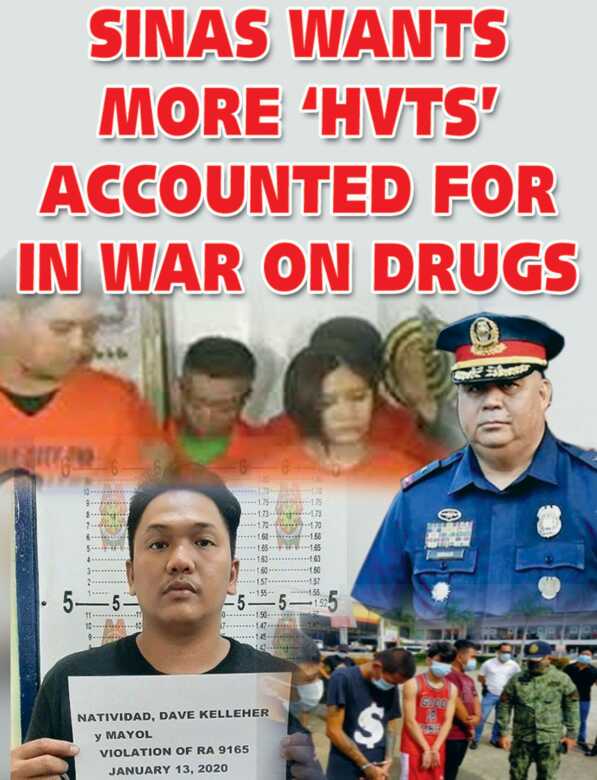PHILIPPINE National Police chief, General Debold M. Sinas, has reiterated his directive for all 17 police regional offices and the different PNP national support units to pursue an unrelenting war on drugs and focus their sights on ‘high-value targets and individuals.
 The top cop issued the series of directives during his 1st Command Conference at the National Capital Region Police Office headquarters in Camp Bagong Diwa in Bicutan, Taguig City as he ordered PNP national operational support units to assist the PNP Drug Enforcement Group in its mission in full coordination with the Philippine Drug Enforcement Agency (PDEA).
The top cop issued the series of directives during his 1st Command Conference at the National Capital Region Police Office headquarters in Camp Bagong Diwa in Bicutan, Taguig City as he ordered PNP national operational support units to assist the PNP Drug Enforcement Group in its mission in full coordination with the Philippine Drug Enforcement Agency (PDEA).
The order means that operatives of the PNP Criminal Investigation and Detection Group, Highway Patrol Group, Anti-Kidnapping Group and the Intelligence Group will have to join the campaign against ‘HVTs,’ not the street-level drug personalities in full coordination with the PNP-DEG headed by Brigadier Gen. Ronald O. Lee and the PDEA headed by Director General Wilkins M. Villanueva.
Sinas also said they are ‘very happy’ with a recent survey which showed the PNP has been fully appreciated by the public for helping arrest drug addiction. The two others are household and local government units.
“It means we are on the right track, that our programs are right from the start. The survey actually vindicates our different programs on illegal drugs,” said the official who was picked by President Rodrigo Duterte to be the 25th PNP chief due to his major contribution in the war against illegal drugs.
Duterte’s marching orders to Sinas is to continue the war against illegal drugs and sustain the “gains” in peace and order, said Presidential spokesperson Secretary Harry Roque.
Sinas has attributed his appointment to Divine Providence and thanked Duterte for trusting him. “I always give my 100 percent. I believe in God that He has a desire for me to serve and protect our people, thus I stand before you now as the 25th chief of the Philippine National Police with a humble heart,” Sinas said when he assumed his post last November 10 vice now retired Gen. Camilo Pancratius P. Cascolan.
The PNP chief has called on his men to “walk the talk.” “My simple wish as father of the PNP is that we should walk the talk and work toward our objectives,” he said.
He also said the PNP would throw its full support behind the government’s war on drugs with the campaign to be refocused on ‘HVTs.’
A 2020 Global Law and Order Report that includes the Philippines in the list of countries with good peace and order and positive perception of the police is due to the aggressive campaign against illegal drugs and pro-active anti-crime strategies that include anti-vagrancy (tambay) operations, said PNP Deputy Chief for Administration, Lieutenant Gen. Guillermo Lorenzo T. Eleazar.
The Dangerous Drugs Board (DDB) headed by Secretary Catalino S. Cuy also said a 2019 drug survey showed that drug use prevalence rate fell to 2.05 percent while 81.6 percent approves of the government’s anti-drug campaign.
The DDB said that around 1.67 million or two out of one hundred Filipinos aged 10 to 69 are current users of drugs, citing results of the 2019 national household survey on patterns and trends of drug abuse.
The 2019 drug survey estimates the current user prevalence rate at 2.05 percent, significantly lower than the 2018 global estimates of 5.3 percent published in the World Drug Report 2020.
Noting the results of the 2019 drug survey and comparing it to the estimates of four million Filipino drug users in 2016 based on anti-drug operations and intelligence data, it shows a clear significant decline which can be attributed to the success of the government’s anti-drug campaign and steadfast priority given by the government to create drug-free communities under the current administration.
Results also indicate high public awareness and approval of the government’s anti-drug campaign. It showed that the directions and programs that the government has undertaken under the current administration have been proven effective as evidenced by the public’s acceptance of the government’s anti-drug campaign and the drop in the user prevalence rate.
Cuy said that based on the survey, it can be concluded that the government not only succeeded in flattening the user prevalence rate but has also reversed the trend.
About 65.8 percent of the respondents said they were aware of the government’s campaign against drugs. Of those who are aware, 81.6 percent approved of the campaign. A high number of respondents also believe that the current drug situation under the present administration has slightly improved (34.7 percent) to greatly improved (45.5 percent).
As a result of the aggressive war on drugs, the PNP was able to reduce the nationwide index crime by 62 percent in the first 42 months of his administration.
In Metro Manila, the National Capital Region Police Office (NCRPO) formerly headed by Sinas recorded a 62 percent decrease in index crime during the same 42-month period, or from 143,643 cases of eight focus crimes to only 54,977—or from 113 cases daily to only 43 cases per day.
